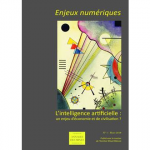Artificial Intelligence hiding behind your computer screen!
Far from the dazzle of intelligent humanoid robots and highly effective chatbots, artificial intelligence is now used in many ordinary products and services. In the software and websites consumers use on a daily basis, AI is being used to improve the use of digital technology. This new dynamic is perfectly illustrated by two startups incubated at Télécom ParisTech: BEYABLE and AiZimov.
Who are the invisible workers managing the aisles of digital shops? At the supermarket, shoppers regularly see employees stocking the shelves, but the shelves of online sales sites are devoid of human contact. “Whether a website has 500 or 10,000 items for sale, there are always fewer employees managing the products than at a real store,” explains Julien Dugaret, founder of the startup BEYABLE. The young company is well aware that these digital showcases still require maintenance. Currently accelerated at Télécom ParisTech and formerly incubated there, it offers a solution for detecting anomalies on online shopping sites.
BEYABLE’s artificial intelligence algorithms use a clustering technique. By analyzing data from internet users’ visits to websites and the data associated with each project, they group the items together into coherent “clusters”. The articles that cannot be included in any of the clusters are then identified as anomalies and corrected so they can be reintegrated into the right place.
“Some products do not have the right images, descriptions or references. For example, a pair of heels might be included in the ‘boots’ category of an online shop,” explains the entrepreneur. The software then identifies the heels so that an employee can correct the description. While this type of error may seem anecdotal or funny, for the companies that use BEYABLE’s services, the quality of the customer experience is at stake.
Some websites offer thousands of articles with product references that are constantly changing. It is important to make sure visitors using the website do not feel lost from one day to the next. “If a real merchant sold t-shirts one day and coffee tables the next, you can imagine all the logistics that would be required overnight. For an online shop, the logistics involved in changing the collection or promoting certain articles is much simpler, but not effortless. The reduced number of online store ‘department managers’ makes the logistics all the more difficult,” explains Julien Dugaret. Artificial intelligence tools play an essential role in these logistics, helping digital marketing teams save a lot of time and ensuring visitor satisfaction.
BEYABLE is increasingly working with websites run by major brands. These websites invest hundreds of thousands of euros to earn consumers’ loyalty. “These websites have now become very important assets for companies,” the founder of the startup observes. They therefore need to understand what the customers are looking for and how they interact with the pages. BEYABLE does more than perform basic analyses, like the so-called “analytics” tools—the best-known being Google Analytics—it also offers these companies, “a look at what they cannot see,” says Julien Dugaret.
The company’s algorithms learn from the visits by categorizing them and identifying several types of internet users: those who look at the maps for nearby shops, those who want to discover items before they buy them, those who are interested in the brand’s activities… “Companies do not always have data experts who can analyze all the information about their visitors, so we offer AI tools suited to this purpose,” Julien Dugaret explains.
Artificial intelligence for professional emails?
For those who use digital services, the hidden AI processes are not only used to improve their online shopping experience. Jérôme Devosse worked as a salesperson for several years and used to study social networks, company websites and news sites to glean information about the people he wanted to contact. “This is business as usual for salespeople: adapting the sales hook and initial contact based on the person’s interests and the company’s needs,” he explains.
After growing weary of doing this task the slow way, he decided to create a tool to automate the research he carried out before appointments. And that was how AiZimov was born, another startup incubated at Télécom ParisTech. “It’s an assistant,” explains Jérôme Devosse. “All I have to do is tell it ‘I want to contact that person‘ and it will write an email based on the public data available online.” Interviews with the person, their company’s financial reports, their place of residence, their participation at trade shows, all of this information is useful for the software. “For example, the assistant will automatically write a message saying, ‘I saw you will be at Vivatech next week, come meet us!”, AiZimov’s founder explains.
The tool works in three stages. First, there is the data acquisition stage which uses technology to search through large volumes of data. Next, the data must be understood. Is the sentence containing the targeted person’s name from an interview or a financial report? What are the associated key words and what logical connections can be made? Finally, the text is generated automatically and can be checked based on different criteria. The user can then choose to send an email that is more formal or more emotional—using things the contact is passionate about—or a very friendly email.
Orange and Renault are already testing the startup’s software. “For salespeople from large companies, the time they save by not writing emails to new contacts is used to maintain the connections they have with existing customers to continue the relationship,” explains Jérôme Devosse. Today, the tool does not send an email without the salesperson’s approval. The personnel can still choose to modify a few details. The entrepreneur is not seeking an entirely automatic process. His areas for future development are focused on using the software for other activities.
“I would like to go beyond emails: once the information is acquired, it could be used to write a detailed or general script for making contact via telephone,” he explains. AiZimov’s technology could also be used for other professions than sales. In press relations it could be used to contact the most relevant journalists by sending them private messages on social networks, for example. And why not make this software available to human resource departments for contacting individuals for recruitment purposes? Artificial intelligence could therefore continue to be used in many different online interactions.





Leave a Reply
Want to join the discussion?Feel free to contribute!